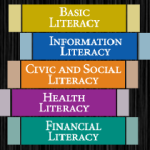by Ashley Flynn, Library Director
Highland Community Library
Eating healthy can be tough, even in the best circumstances. It requires planning smart meals, purchasing and preparing ingredients, and then controlling portions when it is finally time to eat. For some, factors like low income or limited access to quality ingredients can make eating healthy feel almost impossible. Fortunately, there is a free program that addresses all these concerns and more. Best of all, this program offers a way to address Health Literacy in your library, with almost no extra work for you!
Nutrition Links, provided by the Penn State Extension, is a free program designed to share valuable information about nutrition and health. According to their website, the program provides “research-based nutrition education to help people and families with limited resources enhance their nutrition, increase their physical activity and develop life skills needed for self-sufficiency and better health.”[1]
The program is presented as a four-week course, which includes sessions on meal planning, portion control, food safety, food storage, and physical activity, among others. 
“It’s not just about food. It’s about the whole gamut – how you plan, shop, fix and eat,” explained Renee’ Pettenati, nutrition education adviser.
The program is intended for low-income families, and there is no charge for participation. Participants who complete the course are presented with a certificate, which can even be useful when applying for jobs. They also receive many free items to help them implement the techniques they’ve learned, such as measuring utensils and thermometers. The photo on the right includes all of the free items patrons received after completing the course at my library.
Offering Nutrition Links is simple. Contact your local Penn State Extension to connect with a nutrition education adviser in your county. Next, pick a date and promote the program to your community. (Pro tip: target your existing story time audience to find families to participate!) Then you can stand back and watch. There’s really nothing else to it! The nutrition education advisers are self-contained education machines and can bring in all of the supplies necessary to provide the program. Each session typically includes a hands-on food demonstration, during which the participants can see the steps in action and sample the tasty recipes – no kitchen required!
As a public librarian, I struggle every day to provide the kind of programs my community needs and deserves without stretching the budget – or myself – too thin. Nutrition Links provides an easy opportunity to offer a quality educational program to your community without costing you a dime, or even very much time. It’s a low-stress option that can fill out your event calendar while providing a valuable service and addressing health literacy, all at the same time!
Visit Nutrition Links for more informaiton. To find out more about my experiences hosting Nutrition Links, contact me at highland@cclsys.org.
[1] Penn State College of Agricultural Sciences. (2015). About the Program. Retrieved from http://extension.psu.edu/health/nutrition-links/about.

